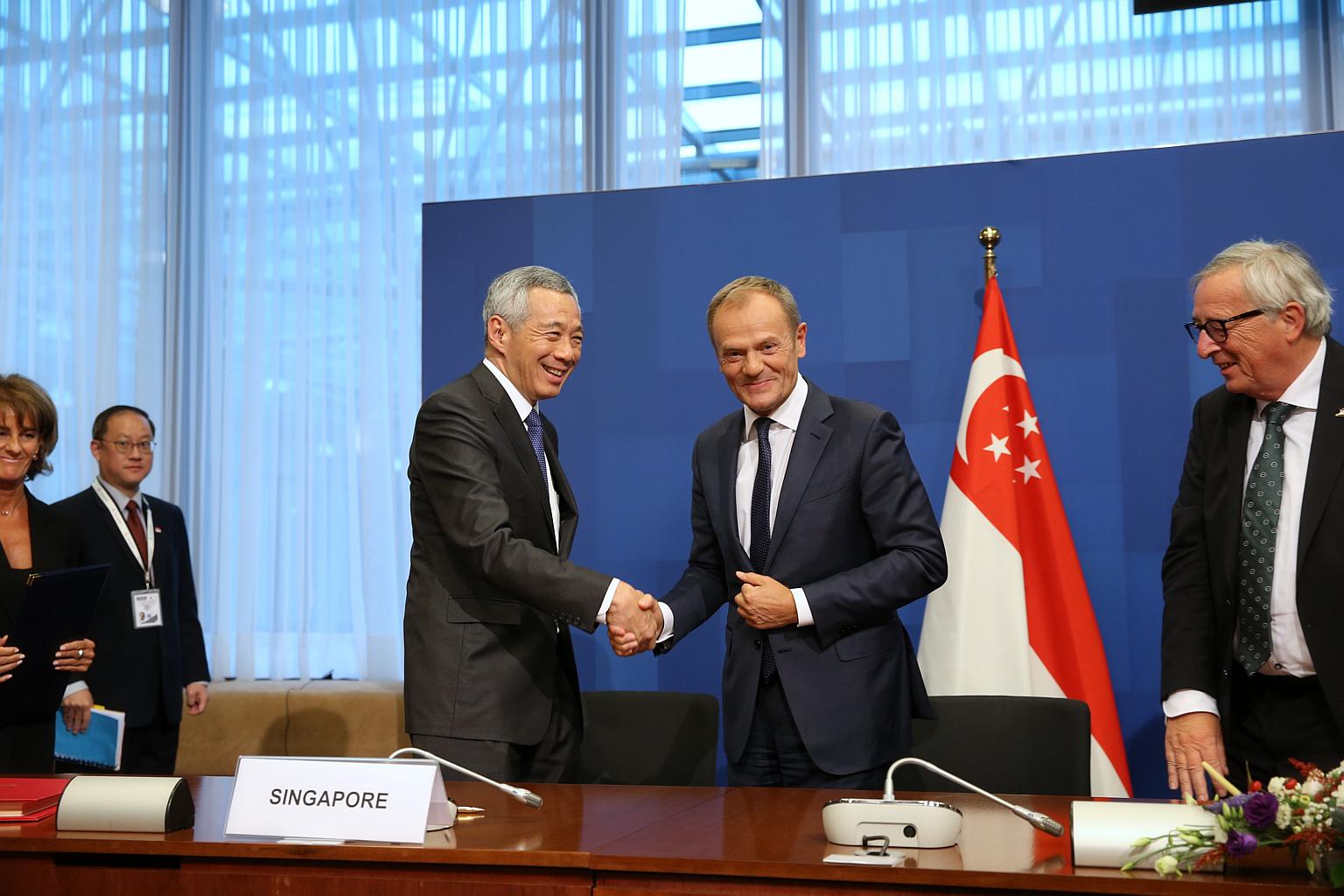Much for Asean, EU to share and learn from each other on current challenges: PM Lee
Sign up now: Get ST's newsletters delivered to your inbox

PM Lee and President of the European Council Donald Tusk shake hands as President of the European Commission Jean-Claude Juncker (right) looks on prior to the signing of the EU-Singapore Free Trade Agreement, on Oct 19, 2018.
ST PHOTO: ONG WEE JIN
BRUSSELS - As two of the world's most successful regional organisations, Asean and the European Union are natural partners, especially in the light of protectionist sentiments that threaten the rules-based global order.
The EU is consistently Asean's largest source of foreign investment and among its top three trading partners. Cooperation is also substantial and growing, spanning many sectors.
Against this backdrop, both sides have much to share and learn from each other as they tackle common challenges like upholding multilateralism, cyber security and climate change, Prime Minister Lee Hsien Loong said at the start of the EU-Asean Leaders' Meeting on Friday evening (Oct 19).
Singapore is the chairman of Asean this year, as well as the current coordinator for Asean-EU dialogue relations until mid-2021.
PM Lee also said he hoped the EU-Singapore Free Trade Agreement signed on Friday will lead to an Asean-EU FTA, which is still in its early stages.
More immediately, he hopes a Comprehensive Air Transport Agreement between Asean and the EU will be settled this year.
This would free up air services on both sides, enabling better connectivity and more links.
Both pacts would also send a signal of the groupings' commitment to multilateralism, trade liberalisation and economic integration.
There is also interest in cooperating on cyber security and smart cities, an initiative for Singapore's chairmanship of Asean this year, as well as on people-to-people cooperation, PM Lee added in an interview with Singapore media at the end of his trip to Brussels for the Asia-Europe Meeting (Asem) summit.
"It's quite a rich agenda. And it involves not just the government but also the private sector, also the people sector," he said.
One item on Asean's agenda this year is a substantial conclusion of the Regional Comprehensive Economic Partnership (RCEP) trade deal between Asean members and six key partners. Asked for an update, PM Lee said officials hope to work towards a conclusion at year end, but it depends on one or two major players.
He said he had discussed this when he met Japanese PM Shinzo Abe, who will meet Indian PM Narendra Modi in his visit to Japan in the week ahead.
As for European sentiments on the stalled Brexit talks and rising protectionism, PM Lee noted that Britain's exit from the EU is a very difficult separation to bring about.
"Both sides would like to work something out. I hope they will," he added.
The British have also said they would like to join the Comprehensive and Progressive Agreement for Trans-Pacific Partnership (CPTPP), which brings together the remaining 11 members of the TPP after the US pullout.
"From Singapore's point of view, we are happy with that," PM Lee said. "The terms have been worked out, and if they are prepared to sign on to the terms as an additional partner, it doesn't cost any competitive difficulties for us. For the other CPTPP parties, the British will have to talk to them," he added. "Singapore's not opposed and in fact supportive."
Other European countries also see potential in developing economic ties with Singapore, especially central and Eastern European countries, he added, citing his conversations with counterparts from Poland, Finland, Estonia and Croatia at Asem.
While trade volumes are quite small, "there is some potential because they have quite high levels of technology, of science".
"They are young countries anxious to find new markets, so we are keen to make friends," PM Lee said.
Also on the agenda was climate change. "Singapore's taking it very seriously. And it's useful to talk to the EU because they are very focused on this," he added.
PM Lee noted that the Europeans have gone the furthest in developing sustainable energy sources like wind and solar power, and encouraging a recycling economy rather than a throwaway or burn economy. "There are some things we can learn from them," he said.


